Online companies rise and fall depending on the quality of search engine optimization.
Let's say you start an online store. The idea rocks, your employees handle customer service like pros, and most of your shipments arrive ahead of schedule. Sounds like a pretty solid start, right?
The only problem lies in the SEO. This hypothetical company has failed to complete research on what it takes to beat out the competition on Google. Therefore, a far less competent company, with sub-par support and a mediocre product beats your company out.
Why? Because they know how to target customers through online ads, and they understand the right keywords that people are searching for.
The interesting part about SEO is that you don't need to be a search engine whiz to make wise decisions. An SEO tool helps quite a bit though.
We have five SEO tools for ecommerce that are bound to improve the way you approach Google. The online solutions provide beautiful reports, graphs and analyses so that you make decisions based on hard evidence, not your gut.
The comparison involves the following websites:
Keep in mind that all of the analysis below revolves around how we feel the the SEO tools benefit ecommerce stores. Obviously the comparisons could help out any type of business, but most of our reasoning will have at least something to do with online commerce.
Spying on the Competition
SEMrush
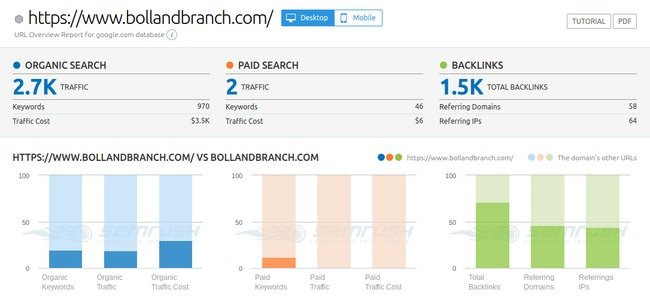
With SEMrush, spying on your ecommerce competition comes easy. Even taking a quick look at the Overview page provides an influx of information such as organic and paid search, traffic cost and keywords.
I enjoy that top anchors are broken down into lists, and the referring domains come in handy for companies looking for places to advertise or place promotional content.
Ahrefs
The primary Site Explorer section for Ahrefs covers everything from referring domains to backlink profiles. The system lets you punch in a competitor URL, and it delivers results for organic and paid traffic.
It's not all about your competitors either, since Ahrefs has plenty of options for analyzing your own site and seeing where you can improve.
SpyFu
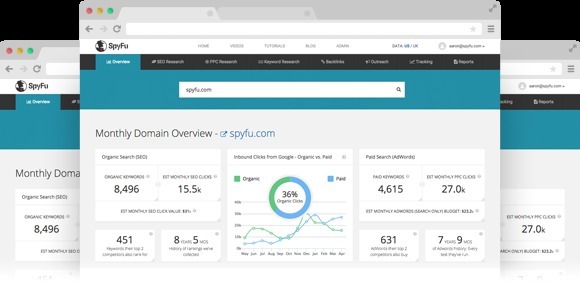
SpyFu presents a decent dashboard for viewing what your competitors are doing with their own marketing campaigns. It's not as modern as the others, but the tools work well.
For example, one chart displays which of your competitor's ads were profitable in the past few months. In addition, it allows you to assess SEO performance and receive automated alerts when something changes with other companies in the industry.
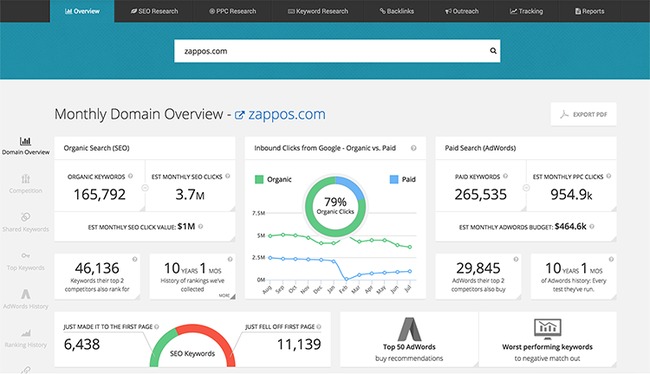
Majestic
Majestic is by far the least user friendly of the bunch. That said, the tools packaged into it are actually rather impressive. I just don't like the interface. It looks old and boring.
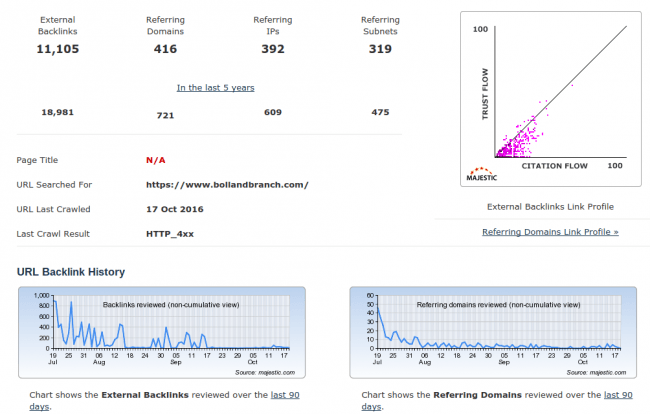
Anyway, the site overview on Majestic reveals backlinks, referring domains, IPs, subnets and more. Each of these are broken down into rudimentary graphs, but for the price I'm not exactly sold on it.
Moz
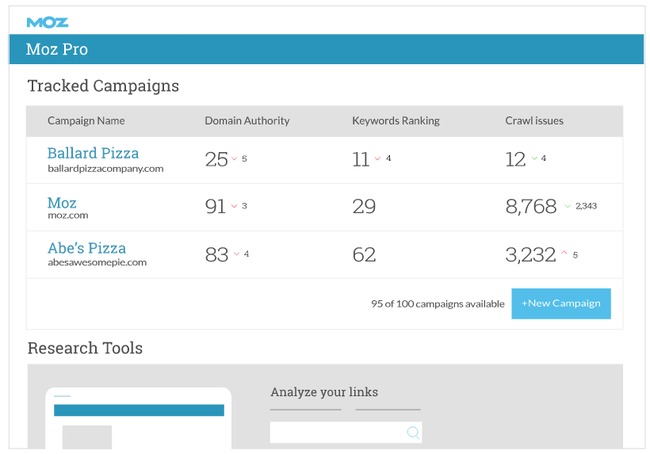
In terms of simplicity and competitor tracking, Moz does it right. It lets you generate multiple campaigns. So, you could evaluate domain authority, keyword ranking and crawl issues for your own online store, along with others in the industry.
Researching Backlinks and Keywords
SEMrush
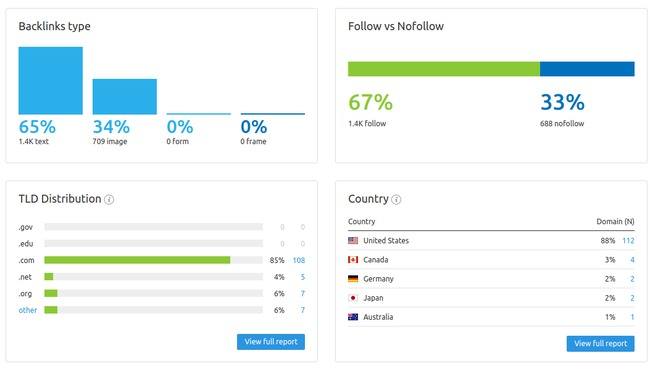
One graph in SEMrush highlights the types of backlinks your competitor is receiving. For example, you might notice that a competitor mainly focuses on image backlinks, giving you an idea of where you might need to improve.
Top anchors show how the referring sites put together their content, while the referring domain lists can be clicked on and evaluated for your own prospects. I like SEMrush the best for its visual breakdowns.
Ahrefs
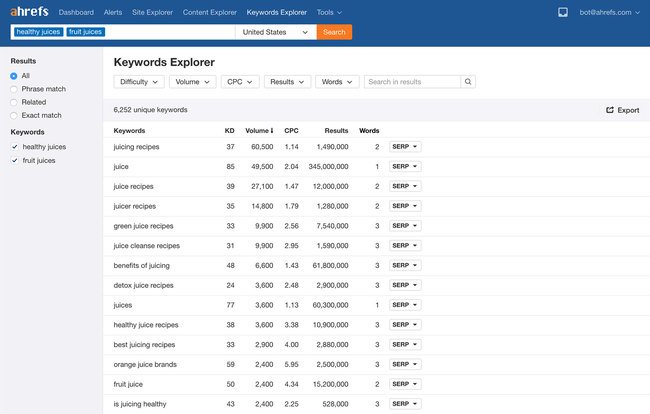
The majority of the backlink analysis takes place in the Site Explorer, but a completely separate Keyword Explorer page reveals keyword lists for you to play around with. Brainstorming comes easy with the most popular options for your online store.
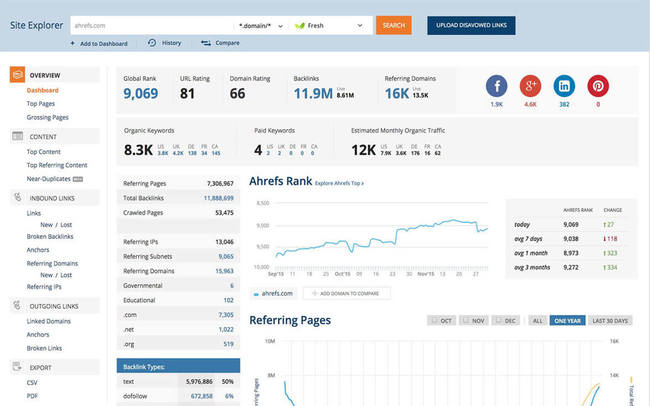
The keyword suggestions are nice, but I truly feel like the main reason to go with Ahrefs is if you want to utilize the Keyword Difficulty Score. This way, you don't spend too much money trying to rank for an impossible keyword.
SpyFu
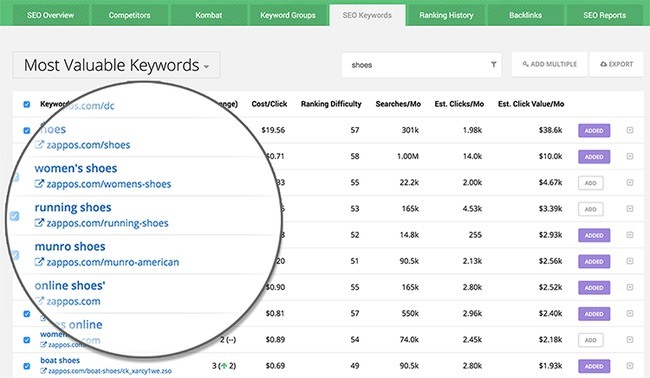
SpyFu has backlink reports and graphs, but they're not as powerful as the other platforms on this list. However, the keyword analysis stands strong. For example, recurring themes show up in a graph, which can then be narrowed down into groups.
You then export the groups, analyze which companies are targeting the keywords, and modify them for your own brand.
Majestic
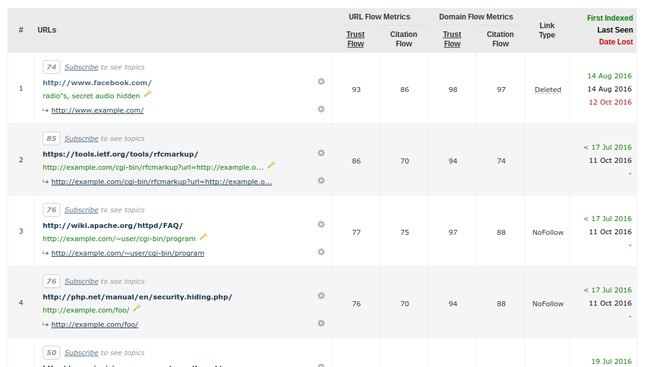
Backlinks show up in a list through Majestic, with trust scores, link types and information for you to see which of the backlinks are actually helping your website.
Once again, I'm not all that impressed with this area of Majestic.
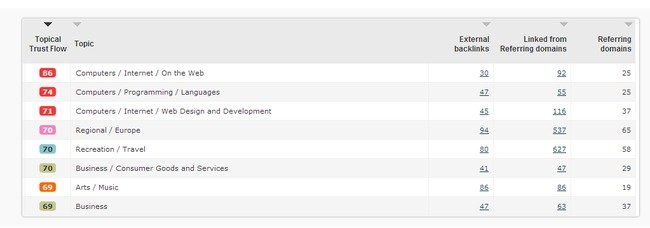
However, the keywords bring up a different story. Although Majestic focuses more on trending “topics,” this provides a unique opportunity to stand out next to your competitors.
Moz
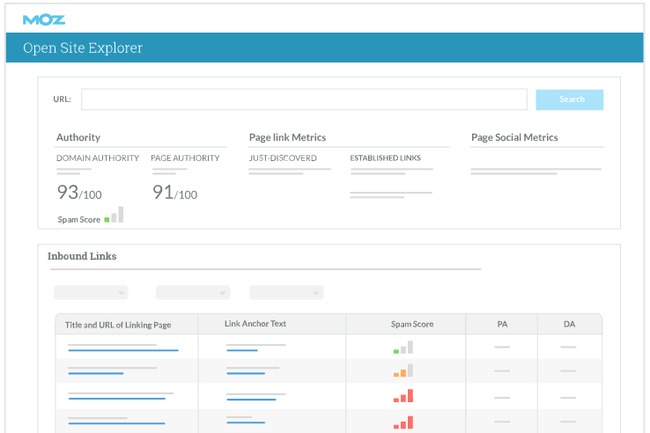
Along with spam score, link anchor text and the URL of a backlink, the graph provided through Moz seems reasonable for understanding how much work you have to complete to catch your competitors.
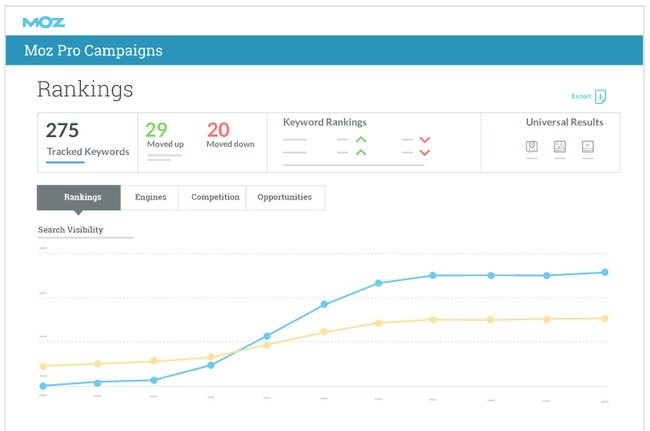
On the other hand, Moz developed a keyword tracking tool to evaluate which of your targeted keywords are hot and not.
Content and Planning Tools
SEMrush
You receive a section named Projects, which includes links to social media support, brand monitoring, backlink auditing and SEO ideas.
The projects launch global campaigns in each of these categories. For example, SEO ideas provide thoughts on what type of content you need to move up in the rankings.
A few of the project sections remain in beta, but they are rather promising for taking action with the information offered through SEMrush.
Ahrefs
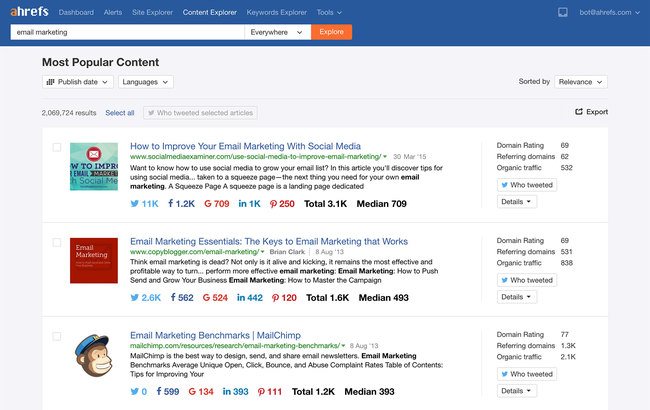
Ahrefs stands out in terms of content exploration, since it has a completely separate module for discovering the most popular content from various topics.
The breakdown involves social shares, organic traffic and backlinks. Furthermore, Ahrefs has a time frame option for browsing articles that were published in the last month, year, etc.
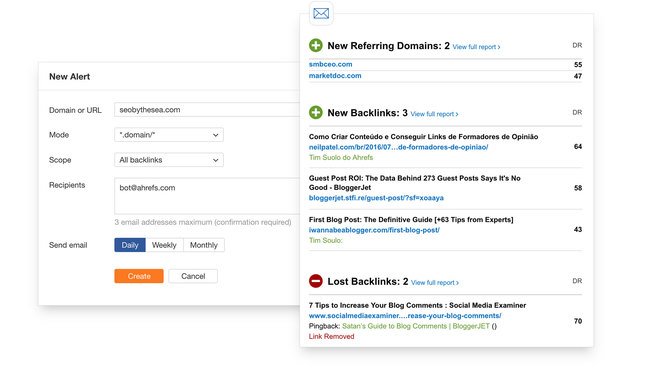
SpyFu
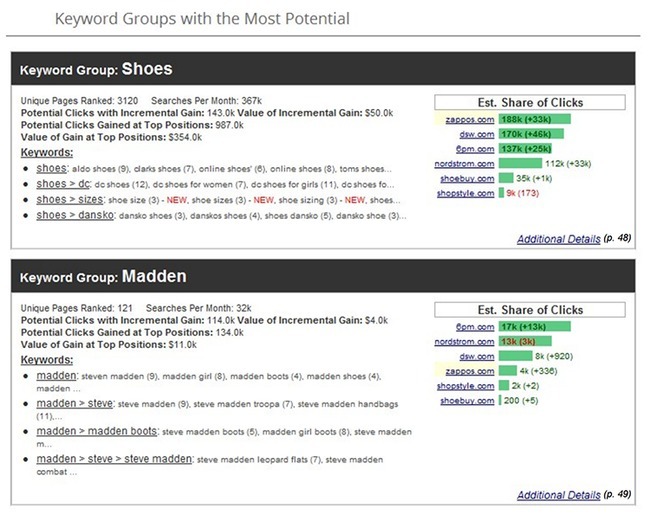
SpyFu poses a solid argument as one of the best content planning SEO tools. It provides a nice area for setting goals with each of your keywords. As time passes, SpyFu lists which groups of keywords are strongest, along with which ones get the biggest gains.
Majestic
Planning content with Majestic isn't nearly as useful than with options like Ahrefs. Yes, turning data into forecasts is possible on your own, but you have to complete most of this work manually.
Moz
Moz fails hard on the content planning front, yet you receive a few tools for analyzing your website and optimizing it for the search engines. I guess this helps out with planning your content, but it's not much different from some of the free tools offered by Google.
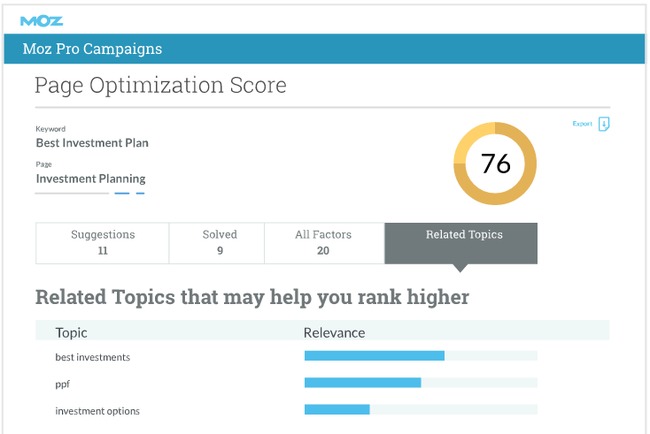
Which One Has the Best Price?
SEMrush
If you'd like to give SEMrush your email address, they provide 10 searches for free. Furthermore, creating an account delivers a full day of reports for your company. However, companies that plan on utilizing SEMruch on a daily basis generally choose to pay for one of the premium plans. SEMrush pricing seems reasonable, and you receive beautiful reports in return.
These include:
- Pro – For $69.95 per month you receive 10,000 results per report, 3,000 reports per day, five projects, 500 keywords to track, 100,000 pages to crawl, 50 social media profiles and five scheduled PDF reports.
- Guru – For $149.95 per month you receive 30,000 results per report, 5,000 reports per day, 50 projects, 1,500 keywords to track, 300,000 pages to crawl, 100 social media profiles and 20 scheduled PDF reports. In addition, you receive branded PDF reports and historical data.
- Business – For $549.95 per month you receive all features from the previous plan, 50,000 results per report, 10,000 reports per day, unlimited projects, 6,000 keywords to track, 1,200,000 pages to crawl, 300 social media profiles and 50 scheduled PDF reports. You also get product listing ads and multi-user management.
Ahrefs
Ahrefs has a 7-day trial, but you have to pay $7 for access. That doesn't make much marketing sense to me, but at least you don't have to pay for a whole month. As you'll notice, Ahref serves as the most comprehensive, and expensive, SEO tool.
As for the plans:
- Lite – For $99 per month you get support for one user, five campaigns, 300 tracked keywords, updates every week, 25 domains per day, three content explorer reports per day, three keyword explorer reports per day, monthly alerts and 25,000 rows for batch analysis.
- Standard – For $179 per month there's support for one user, 10 campaigns, 1,000 tracked keywords, updates every three days, 100 domains per day, 100 content explorer reports per day, 50 keyword explorer reports per day, weekly alerts and 100,000 rows for batch analysis.
- Advanced – For $399 per month you receive three users, 25 campaigns, 4,000 tracked keywords, updates every day, 250 domains per day, 500 content explorer reports per day, 200 keyword explorer reports per day, daily alerts and 400,000 rows for batch analysis.
- Agency – For $999 per month five users are supported, 100 campaigns, 10,000 tracked keywords, updates every day, 1,000 domains per day, 2,500 content explorer reports per day, 1,000 keyword explorer reports per day, hourly alerts and 1,000,000 rows for batch analysis.
SpyFu
Although SpyFu doesn't offer a free trial, the company has a 30-day money back guarantee. Cheaper than all the rest, SpyFu works nicely for those companies with smaller budgets. The software doesn't have the multitude of features you would find elsewhere, but small and medium ecommerce shops should be fine.
The pricing plans are listed below:
- Basic – For $49 per month you receive unlimited search results, unlimited data exports, unlimited PDF domain overview, 250 sales leads and domain contacts, 5,000 weekly tracked keyword rankings and 10,000 top lists results.
- Professional – For $49 per month you gain access to everything in the previous plan, 500 sales leads and domain contacts, 15,000 weekly tracked keyword rankings, 50,000 top lists results, 10,000 API calls and custom branded reporting.
- Pro-Monthly – For $74 per month you get everything in the previous plan, 500 sales leads and domain contacts, 15,000 weekly tracked keyword rankings, 50,000 top lists results, 10,000 API calls and custom branded reporting.
I know what you're thinking. The Pro-Monthly looks identical to the Professional plan. That's because it is. The initial two plans are quoted as monthly packages, but you get charged on a yearly basis. Therefore, the Pro-Monthly options allows companies to go on a month by month basis.
Majestic
Although a few free tools come along with Majestic, the 7-day money back guarantee presents the most appealing pricing benefit. Majestic pricing sits in the middle of the road. That said, the tool analyzes millions of backlinks.
Now, let's take a look at the actual plans:
- Silver – For $78.99 per month, Majestic offers support for one user, a historic index, raw exports, cloud report storage, 5 million downloadable backlinks, 60 detailed reports per month, 5 million analyzable backlinks, 1 million retrivable API units and 25,000 index item units.
- Gold – For $169.99 per month, Majestic provides support for five users, everything from the previous plan, 25 million downloadable backlinks, 300 detailed reports per month, 25 million analyzable backlinks, 5 million retrievable API units and 125,000 index item units.
- Platinum – For $399.99 per month, Majestic allows for 15 users, everything from the previous plan, 100 million downloadable backlinks, 950 detailed reports per month, 100 million analyzable backlinks, 20 million retrievable API units and 500,000 index item units.
Moz
Moz has two products: Moz SEO and Moz Local. Seeing as how ecommerce businesses generally cater to larger geographical areas, we're only looking at the Moz SEO solution. That said, Moz includes a 30-day free trial before making you commit to one of the plans below.
- Standard – For $99 per month, Moz gives you five campaigns, 300 keyword rankings, 250,000 crawled pages, no branded reports, five keyword reports, no keyword lists and support for two users.
- Medium – For $149 per month, Moz includes 10 campaigns, 750 keyword rankings, 500,000 crawled pages, branded reports, 5,000 keyword reports, 30 keyword lists and support for 10 users.
- Large – For $249 per month, Moz provides 25 campaigns, 1,900 keyword rankings, 1,250,000 crawled pages, branded reports, 15,000 keyword reports, 60 keyword lists and support for 25 users.
- Premium – For $599 per month, Moz has 100 campaigns, 7,500 keyword rankings, 1,250,000 crawled pages, branded reports, 30,000 keyword reports, 100 keyword lists and support for unlimited users.
Which SEO Tool is Best for Ecommerce?
I like SpyFu for companies with smaller budgets, but if you have the money to pay for Ahrefs, go for it, and don't look back.
Most of the solutions provide solid keyword and backlink tools, but when it comes to content planning, Ahrefs destroys the competition. SEMrush has a modest set of tools as well, so I would recommend SEMrush for a company with some money to spend, Ahrefs for those with lots of money to spend, and SpyFu for the startups and small businesses.
The other two are fine, but you have better options on the market.




wow… nice information here… nice blog.
keep it up..
thank you
Glad you liked it Mazrat!
–
Bogdan – Editor at ecommerce-platforms.com
Hey, Catalin
Thanks for including SpyFu in your comparisons (and for the kind words about our strengths with content planning). I wanted to chime in about the pricing since it’s actually simpler than it seems.
The Basic plan is $79/month.
If you prefer to pay annually (up front) for that same level of access, it’s $599 for the year (which breaks down somewhere close to $49/month).
The Professional Plan is $139/month.
Just like with the Basic plan, you can choose to pay up front once a year to get a price break. That would be $899 for the year. (That breaks down to almost $75/month.)
I hope that helps. Thanks again!
Hey Sidra,
Thanks for letting us know!
Best,
–
Bogdan – Editor at ecommerce-platforms.com
I like Ahrefs too but it is pricey,
Yeah, you’ve gotta be pretty serious about SEO to justify the cost of Ahrefs. It is an incredible tool though. It’s a serious bummer that they got rid of the ability to do a couple free Ahrefs searches a day, and it’d be nice if they’d introduce some sort of cheaper plan for bums like me. I just don’t use it enough to justify paying $99/month for it.